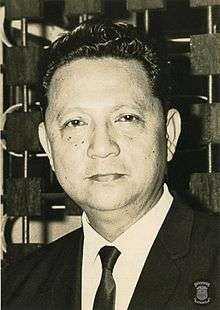Lorenzo Teves
Lorenzo Guivelondo Teves (born April 29, 1918, date of death unknown) was a Philippine politician who served in various positions in the Philippine Government. Teves hailed from the Province of Negros Oriental, where he took his college and law degrees from Silliman University.[4] He was later on elected as representative of the 1st District of the province and served in that capacity from 1954 to 1965 in the 3rd, 4th and 5th Congresses of the Philippines. In 1967 he was elected as a senator for the 6th Congress and 7th Congress.[5] However, his term was cut short when President Ferdinand Marcos declared Martial Law in 1972.[6] In 1978, he was appointed by President Marcos as governor of Negros Oriental, and in 1979, was elected for that same position. He continued to hold the office until 1987. A sports complex and a street in his hometown of Dumagutte was later named after Lorenzo Teves after his death. He is succeeded by eight children from his first marriage and three children from his second marriage.[7]
Lorenzo Teves | |
|---|---|
 | |
| Senator of the Philippines | |
| In office December 30, 1967 – September 23, 1972[1] | |
| Member of the Philippine House of Representatives from Negros Oriental's First District | |
| In office December 30, 1953 – December 30, 1967 | |
| Preceded by | Pedro Bandoquillo |
| Succeeded by | Vacant Post later held by Herminio Teves |
| In office May 25, 1946 – December 30, 1949 | |
| Preceded by | Julian Teves |
| Succeeded by | Pedro Bandoquillo |
| Governor of Negros Oriental | |
| In office 1978 – June 30, 1987 | |
| Appointed by | Ferdinand Marcos |
| Personal details | |
| Born | April 29, 1918[2] Valencia, Negros Oriental, Philippine Islands |
| Died | October 17, 1996[3] Philippines |
| Nationality | Filipino |
| Spouse(s) | Eva Jalandoni |
| Children | Eight children to Jalandoni and three children in his second marriage |
| Residence | Dumaguete City |
| Alma mater | Silliman University |
| Occupation | Politician |
Civic Affairs
Late Senator Lorenzo G. Teves,KCR was the Area Commander for Visayas 1981-1985 of the Knights of Rizal. He was also Awarded the Hall of Fame Boys Scouts of the Philippines Negros Oriental -Siquijor Council .
Footnotes
- Congress was dissolved when President Ferdinand Marcos declared Martial Law in 1972.
- Soriano, D. H.; Isidro L. Retizos (1981). The Philippines who's who. Who's Who Publishers. p. 365.
- "Outstanding Sillimanian Awardees" Archived 2009-07-25 at the Wayback Machine. Silliman University. Retrieved 2010-05-17.
- Unlike members of the House of Representatives, the term of a senator under the 1935 Philippine Constitution was six years. Each congress (which literally means a meeting of senators and representatives in the House of Congress) has a period of three years. Thus, having been elected for a senatorial term of six years, Teves' tenure spanned two congresses.
- "List of Previous Senators" Archived 2007-04-23 at the Wayback Machine. Senate of the Philippines. Retrieved 2010-05-17.
- "Political History and Cultural History". Province of Negros Oriental. Retrieved 2010-05-17.
External links
- House of Representatives. Official website
- Senate of the Philippines. Official website